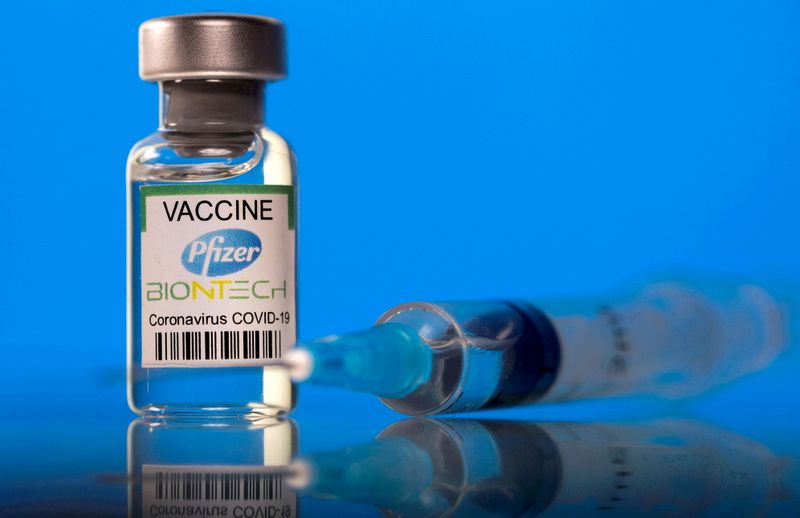By Manas Mishra and Michael Erman
(Reuters) - An expert panel on Tuesday voted overwhelmingly to recommend the U.S. Food and Drug Administration authorize the Pfizer Inc (NYSE:PFE) and BioNTech SE (NASDAQ:BNTX) COVID-19 vaccine for children ages 5 to 11, saying the benefits of the shot outweigh the risks.
An authorization for that age group would be would be an important regulatory step toward reaching about 28 million children for inoculation, most of them back in school for in-person learning.
The vaccine could be available to the younger age group as soon as next week. The FDA is not obligated to follow the advice of its outside experts, but usually does. The vote was 17 in favor with one abstention.
If the FDA authorizes the shots for this age group, an advisory panel to the U.S. Centers for Disease Control and Prevention will meet next week to make a recommendation on the administration of the vaccine. The CDC director will make the final call.
While children becoming seriously ill or dying from COVID-19 is relatively rare compared with adults, some develop complications, and infections in unvaccinated kids have risen due to the easily transmitted Delta variant of the coronavirus. Data from the American Academy of Pediatrics shows that more than 500 U.S. children have died from COVID-19.
It "is the eighth highest killer of kids in this age group over the past year," said Dr. Amanda Cohn, a pediatric vaccine expert at the CDC and a voting member of the panel. "Use of this vaccine will prevent deaths, will prevent ICU admissions and will prevent significant long-term adverse outcomes in children."
Only a few other countries, including China, Cuba and the United Arab Emirates, have so far cleared COVID-19 vaccines for children in this age group and younger.
In the United States, just 57% of the population is fully vaccinated, lagging other nations such as the UK and France.
Still, the percentage of young children who receive the shots may be low. The U.S. vaccination rate for 12- to 15-year-olds trails other age groups at roughly 47%.
The World Health Organization since May has been urging rich countries to reconsider plans to vaccinate children and instead donate COVID-19 shots to the COVAX program for distribution to poorer countries.
LOWER DOSE
Pfizer and BioNTech are seeking clearance for a lower, 10-microgram dose of the vaccine in young children, versus 30 micrograms for those age 12 and older. The shot has been authorized for ages 12-15 since May after being cleared for those age 16 and older in December.
The companies have said their vaccine showed 90.7% efficacy against the coronavirus in a clinical trial of children aged 5 to 11.
The advisers paid close attention to the rate of a heart inflammation called myocarditis that has been linked to both the Pfizer/BioNTech and Moderna (NASDAQ:MRNA) vaccines, particularly in young men.
If the number of myocarditis cases in the younger age group turns out to be similar to that in 12- to 15-year-olds, the hospitalizations prevented for COVID-19 would outnumber those prevented for myocarditis in most scenarios analyzed, FDA staff reviewers said in documents prepared ahead of Tuesday's meeting.
Some panel members suggested that due to the myocarditis risk, the vaccine should be given to a narrower group of children, such as those with conditions that make them more likely to be hospitalized.
"There are certain kids that should be vaccinated. The question of how broadly to use it, I think it's a substantial one," said Eric Rubin, Editor-in-Chief of the New England Journal of Medicine.
If authorized, the Pfizer/BioNTech vaccine is likely to be the only one available to the age group in the United States for some time.
On Monday, Moderna released data from its own clinical trial of children ages 6 to 11, and said it would soon ask regulators for authorization in the age group.

It is unclear when U.S. regulators will consider that. The company is still waiting for a response to its application filed in June for use of its vaccine in children ages 12 through 17.
Pfizer has said it could have data from its clinical trial in even younger children - ages 2 to 4 - by year end.